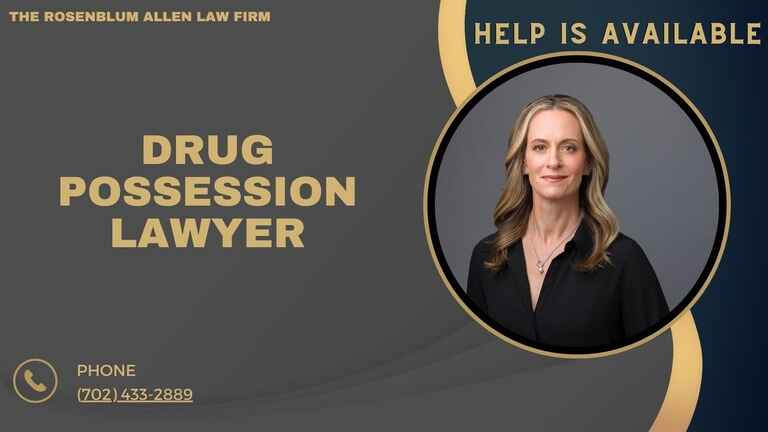Drug Possession Lawyer: What to Expect and How to Find the Right Attorney
Understanding Drug Possession Charges
Definition of Drug Possession
Drug possession occurs when someone has illegal drugs in their control or on their person. It doesn’t always mean you were holding the drugs at the time of arrest—they could have been in your car, home, or even in your pocket without your knowledge.

 Types of Drugs Involved
Types of Drugs Involved
Some of the most common drugs involved in possession cases include:
- Marijuana (though laws vary by state)
- Cocaine
- Heroin
- Methamphetamine
- Prescription drugs without a valid prescription (e.g., opioids, stimulants)
Simple Possession vs. Possession with Intent to Distribute
There’s a key difference between simple possession and possession with intent to distribute:
- Simple possession: Typically refers to having a small amount of a drug meant for personal use.
- Possession with intent to distribute: Involves larger quantities or other factors (e.g., packaging materials, scales) that suggest the drugs were meant to be sold.
Common Penalties for Drug Possession
Penalties for drug possession can vary widely based on the drug, the amount, and the laws of your state. In Nevada, penalties are especially harsh for Schedule I and II controlled substances.
Fines and Fees
You could face steep fines for a possession conviction. These range from hundreds to thousands of dollars depending on the severity of the charge.
Jail or Prison Time
Jail time is a very real possibility, particularly for repeat offenders or cases involving serious drugs like cocaine or methamphetamine.
Probation and Community Service
In some cases, judges may offer probation or community service as an alternative to jail time. This often depends on the specifics of your case, your criminal history, and the effectiveness of your legal defense.
Impact on Criminal Record
A drug possession conviction can go on your permanent record, affecting your ability to:
- Get a job
- Rent an apartment
- Obtain certain licenses
Some states offer diversion programs to keep first-time offenders out of the system, but the consequences are still serious.
How a Drug Possession Lawyer Can Help
Evaluating Your Case
A drug possession lawyer can make a huge difference by carefully reviewing the details of your case. This includes:
- Examining the evidence against you
- Understanding the circumstances of your arrest
- Finding any potential violations of your rights
Review of Evidence
Your lawyer will analyze how the drugs were found, whether the search was legal, and if any evidence might have been mishandled.
Identifying Violations of Rights (Search and Seizure Issues)
In many cases, a successful defense involves proving that your rights were violated. If the police didn’t have probable cause or conducted an unlawful search, the evidence against you might be thrown out.
Building a Defense Strategy
Once the lawyer understands your case, they will build a defense specific to your situation. Possible strategies include:
- Arguing that the drugs were not yours
- Challenging the legality of the search
- Negotiating for reduced charges
Challenging the Legality of the Arrest
If your arrest involved any police misconduct—like improper searches or not being read your rights—your lawyer could get the charges reduced or even dismissed.
Questioning the Credibility of Evidence (Ownership, Lab Testing)
A common defense is questioning whether the drugs actually belonged to you. Your lawyer can also challenge the results of drug tests or argue that the drugs were not correctly identified.
Reducing Charges or Sentences
Even if the evidence against you seems strong, a drug possession lawyer can often help reduce the severity of the consequences.
Plea Bargains
In some cases, it’s in your best interest to accept a plea bargain. This usually means pleading guilty to a lesser charge in exchange for a lighter sentence.
Seeking Alternative Sentencing (Rehabilitation, Probation)
Your lawyer may push for alternative sentencing options like drug rehabilitation programs or probation instead of jail time, especially if this is your first offense.

What to Look for in a Drug Possession Lawyer
Experience with Drug-Related Cases
When choosing a lawyer for a drug possession charge, it’s important to find someone who understands the ins and outs of these cases. Experience can make a big difference in how your case is handled.
Familiarity with Local Courts and Laws
Drug laws vary by state, and local court systems often have their own procedures. An experienced lawyer will know how local judges and prosecutors handle drug possession cases. This knowledge helps them choose the best strategy for your defense.
Track Record in Defending Drug Possession Cases
It’s worth finding a lawyer with a proven history of successfully defending clients in drug possession cases. Ask about their previous cases. How many have they won or had dismissed? Success in similar cases is a strong sign of their ability to handle your defense.
Communication Skills
Good communication is key when working with a lawyer. You need someone who can clearly explain your options and keep you updated about what’s happening with your case.
Clear Explanation of Your Legal Options
The legal system can feel overwhelming. A strong lawyer will break everything down in simple terms. They’ll walk you through your options, possible outcomes, and what each choice means for your future.
Responsiveness and Availability
You want a lawyer who will be there when you need them. Can you easily reach them? Do they return your calls or emails quickly? A lawyer who is responsive shows that they value your case and are committed to helping you.

The Legal Process for Drug Possession Cases
Arrest and Booking
If you’re arrested for drug possession, the process can feel confusing and frightening. Here’s what typically happens after an arrest.
What Happens After a Drug Possession Arrest
Once arrested, you’ll be taken to a police station for booking. This includes:
- Taking your fingerprints
- Taking your photo (mugshot)
- Recording your personal information
After booking, you may be placed in a holding cell while you wait for your initial court appearance.
Your Rights During the Arrest Process
During an arrest, you have rights that must be respected. This includes the right to remain silent and the right to an attorney. If your rights are violated at any point, it could impact the outcome of your case.
Court Appearances and Arraignment
After your arrest, you’ll have to appear in court. The first court appearance is called an arraignment.
Entering a Plea
At your Nevada arraignment, the judge will formally read the charges against you, and you’ll be asked to enter a plea—usually “guilty,” “not guilty,” or “no contest.” Your lawyer will help you decide how to plead based on the specifics of your case.
Setting Bail and Pretrial Motions
The judge may also decide whether to set bail. Bail allows you to be released from jail while awaiting trial. Your lawyer can request bail to be set at a reasonable amount or argue for your release without bail. Pretrial motions may also be filed at this stage, which can affect the direction of your case.
Trial or Settlement Options
You and your lawyer will need to decide whether to go to trial or explore other options like negotiating a plea deal.
Going to Trial vs. Negotiating a Plea
If you go to trial, the prosecutor will have to prove beyond a reasonable doubt that you are guilty. This can be risky, but if your lawyer believes the evidence is weak, it might be worth taking the chance. On the other hand, negotiating a plea deal might lead to reduced charges or a lighter sentence without the uncertainty of a trial.
Potential Outcomes of a Trial
If your case goes to trial, the outcome could range from an acquittal (not guilty) to a conviction (guilty). If convicted, you could face penalties like jail time, fines, or probation, depending on the severity of the charges and your criminal history.
Hiring the Right Drug Possession Lawyer
Where to Find a Qualified Attorney
Finding the right lawyer can feel overwhelming. Here are some effective ways to locate a qualified drug possession attorney.
Online Resources and Referrals
- Search Engines: Start by using search engines to look for local lawyers who specialize in drug possession cases.
- Legal Directories: Websites like Avvo or FindLaw list lawyers by area of expertise. You can read reviews and check ratings.
- Referrals from Friends and Family: Ask people you trust if they know a good lawyer. Personal experiences can lead you to someone reliable.
Evaluating Online Reviews and Testimonials
Once you have a list of potential lawyers, it’s time to assess them. Look for:
- Client Reviews: Check online reviews to see what past clients have to say. Positive feedback about communication and outcomes is a good sign.
- Case Results: Some lawyers publish case results on their websites. This can give you insight into their success rates.
Initial Consultation
Many lawyers offer a free initial consultation. This is your chance to see if they are a good fit for you.
Questions to Ask During the Consultation
Use this meeting to ask important questions:
- What is your experience with drug possession cases?
- What strategies do you think would work for my case?
- How do you communicate with your clients?
- What are your fees and payment options?
Determining Fees and Payment Structures
Understanding how a lawyer charges is key. Here are some common structures:
- Hourly Rate: You pay for the time the lawyer spends on your case.
- Flat Fee: A set amount for specific services, often for straightforward cases.
- Retainer: An upfront fee to secure the lawyer’s services, which is then drawn against as work is done.

Breaking It All Down
Importance of Hiring a Drug Possession Lawyer
Hiring a drug possession lawyer is essential for navigating the challenges of the legal system. They protect your rights and advocate on your behalf.
Next Steps
Once you’ve found a lawyer you feel comfortable with:
- Schedule your initial consultation.
- Gather all relevant documents related to your case.
- Prepare questions to discuss during your meeting.
A strong defense can make all the difference in your situation. Take your time to choose the right attorney, and don’t hesitate to ask for help along the way.

Frequently Asked Questions
What should I do immediately after being arrested for drug possession?
After an arrest, it’s important to remain calm and exercise your rights. You have the right to remain silent and to request an attorney. Avoid discussing your case with anyone until you have legal representation.
How long does a drug possession case typically take?
The duration of a drug possession case can vary widely depending on the complexity of the case, the court’s schedule, and whether a plea deal is negotiated. Some cases may be resolved in a few months, while others could take longer.
Can a drug possession charge be expunged from my record?
In many cases, it is possible to have a drug possession charge expunged from your criminal record, especially if it was a first offense. The process and eligibility depend on state laws, so it’s best to consult with your lawyer about your specific situation.
What are the possible penalties for drug possession?
Penalties for drug possession can range from fines and probation to jail time, depending on the type and amount of drugs involved, your prior criminal history, and other factors. Your lawyer can provide more specific information based on your case.
Will my case go to trial?
Not all drug possession cases go to trial. Many cases are resolved through plea deals or other negotiations. Your lawyer will help you assess the likelihood of going to trial based on the evidence and circumstances.
What if I can’t afford a lawyer?
If you cannot afford a lawyer, you may qualify for a public defender. Public defenders are provided by the state and can represent you in criminal cases, including drug possession charges.
How does a plea deal work?
A plea deal is an agreement between you and the prosecutor in which you plead guilty to a lesser charge or receive a lighter sentence in exchange for not going to trial. Your lawyer can negotiate these deals on your behalf.
Can I represent myself in a drug possession case?
While you have the right to represent yourself, it is generally not advisable, especially in drug possession cases. The legal system can be complex, and having an experienced lawyer can significantly improve your chances of a favorable outcome.
What should I bring to my initial consultation with a lawyer?
Bring any relevant documents, such as arrest records, court papers, and any correspondence related to your case. This information will help your lawyer understand your situation better.
How can I prepare for my court appearance?
Preparation for a court appearance is key. Follow your lawyer’s advice, dress appropriately, and arrive early. Your lawyer will guide you on what to expect and how to behave in court.

More Resources for You
Molly Rosenblum, Esq., our lead attorney, has meticulously developed an extensive array of resources to provide support and guidance in various aspects of criminal defense law. These resources, accessible through the Rosenblum Law website, are designed to offer you comprehensive insights and legal expertise, assisting you in navigating the complexities of the criminal justice system. Here’s a summary of the resources that Molly Rosenblum, Esq. has created to help you in your time of need:
Criminal Defense Attorneys: A thorough resource offering expert defense strategies and legal counsel for a wide range of criminal charges. Explore your defense options.
Las Vegas DUI Lawyer: Specialized guidance and representation for those facing DUI charges in Las Vegas, ensuring knowledgeable and robust defense. Learn more about DUI defense.
Domestic Violence Lawyer Las Vegas: Expert legal support for individuals facing domestic violence charges, providing compassionate and assertive representation. Find support for domestic violence charges.
Sex Crimes Attorney: Specialized representation for those accused of sex-related offenses, ensuring a respectful and determined approach to these sensitive cases. Learn about sex crime defense.
- Misdemeanor Lawyer: Guidance and representation for misdemeanor charges, ensuring your rights are protected throughout the legal process. Explore misdemeanor defense strategies.
Juvenile Defense Lawyers: Specialized legal support for minors facing criminal charges, focusing on tailored defense strategies and the unique aspects of juvenile law. Learn about juvenile defense.
Las Vegas Warrant Defense Attorney: Assistance in dealing with outstanding warrants, aiming to resolve these issues discreetly and efficiently. Address your warrant concerns.
Las Vegas Probation Violation Attorney: Expert advice and representation for probation violation matters, helping you navigate the potential consequences and legal implications. Understand probation violation ramifications.
Theft Crime Defense Lawyer: Skilled defense for theft-related charges, focusing on protecting your rights and securing the best possible outcome. Discover theft crime defense tactics.
Kidnapping Lawyers: Experienced legal representation for kidnapping charges, ensuring a comprehensive and assertive defense. Learn about kidnapping defense strategies.
Firearms Lawyer Las Vegas: Specialized legal guidance for firearms-related charges, focusing on the specifics of Nevada gun laws and your rights. Explore firearms defense options.
Molly Rosenblum, Esq., through these expertly prepared resources, is committed to providing you with the knowledge and representation needed to face criminal charges with confidence. We encourage you to utilize these resources, ensuring that your defense is as strong and informed as possible.

A Special Message from the Author, Our Lead Attorney

Molly Rosenblum, Esq
Dear Reader,
Thank you for taking the time to read through the resources we have available.
Navigating the legal landscape surrounding drug cases can be challenging, but we believe that knowledge is power, and we hope these resources have empowered you.
Each drug case is unique and deserves individual attention.
That’s why I would like to invite you for a free consultation.
This will allow us to understand your situation better and provide you with the best possible legal advice.
Please don’t hesitate to contact us at (702) 433-2889 to schedule your free consultation.
Remember, you don’t have to face this alone. We are here to help.
Best Regards,
Molly Rosenblum, Esq.




